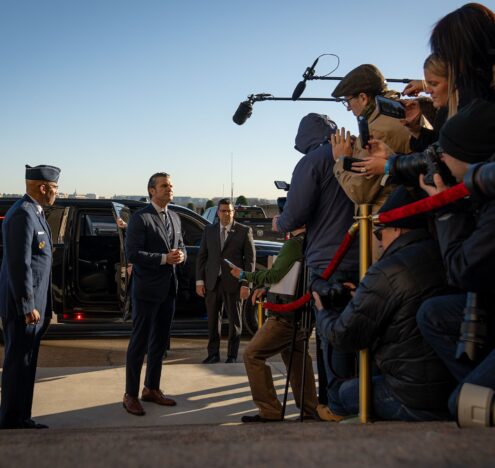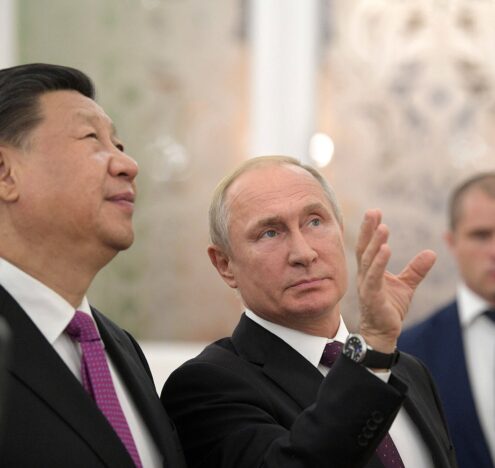In March, the Senate narrowly defeated a bill sponsored by Sens. Bernie Sanders, I-Vt., Mike Lee, R-Utah, and Chris Murphy, D-Conn., that would have ended US support for Saudi Arabia’s brutal war in Yemen. Following the defeat of that initiative, other senators have proposed more moderate steps Congress can take to temper the Saudi-led coalition’s intervention.
The administration has already signaled, however, that it will eschew this stick for bunches of carrots: in just the past three weeks, the Pentagon has notified Congress of four separate arms deals to Saudi Arabia totaling over $2.3 billion. This package comes on the heels of a $270 million missile transfer to the United Arab Emirates, coalition co-leader, announced on March 7.
These announcements are a clear message to lawmakers increasingly skeptical of US involvement in Yemen’s civil war: business with Saudi Arabia will continue as usual.
Congress must forcefully push back against this message, for two reasons. First, these weapons may find their way into Yemen’s conflict, where they will exacerbate civilian suffering. Second, by pushing these packages now, the administration is laying the groundwork for another massive transfer of precision-guided munitions, weaponry that both the United Nations and independent human rights groups have linked to the worst atrocities of the coalition’s air war.
Three of the four sales to Saudi Arabia are particularly concerning. The first is a $106 million deal for helicopter upkeep, covering in part the maintenance and repair of Apache helicopters. Like their fighter jets, the Saudi-UAE-led coalition has used attack helicopters in its violations of the laws of war in Yemen. Their deadliest strike may have occurred in March 2017, when a coalition helicopter killed 42 Somali refugees attempting to flee the conflict by boat.
The second and third deals, the transfer of 6,600 TOW (tube-launched, optically tracked, wire-guided) 2B missiles and 180 M109 Paladin howitzer systems to Saudi Arabia, are concerning because they could worsen on-the-ground fighting. The Saudi government has bought thousands of TOW munitions in recent years, redistributing some to proxy forces in the region’s civil conflicts. While many have been sent to favored anti-Assad combatants in Syria, Asharq Al-Awsat reported in November 2015 that the Saudi-led coalition had passed TOW missiles along to forces fighting Houthi rebels in Taiz, where civilians are caught up in the war’s worst frontline.
Additionally, though the $1.31 billion howitzer system notification states that the weapons are for Saudi border defense, the coalition has also used howitzers inside Yemen. In September 2016, the Washington Post reported allegations that Saudi-supported forces used howitzers to launch white phosphorus rounds at Houthi militias near Sana’a. There are also reports that coalition-backed forces are using howitzers in an ongoing campaign on Yemen’s west coast that ultimately seeks to recapture Hudaydah port, an operation that the international humanitarian community has warned against for months for its inevitably catastrophic impact on the civilian population.
Congress shouldn’t normalize weapons transfers to the Saudi government while the intervention continues. Last June, 47 Senators voted against transferring precision-guided munitions (PGM) kits to the Saudi government because of its attacks on civilians. The administration has to hope that Congress will not move against a future precision-guided munition sale, like the multi-billion dollar deal that is reportedly in the works now.
The rationale for blocking another PGM sale remains. Though last June’s transfer proceeded because of Saudi government promises to improve targeting practices with US help, Security Council experts recently concluded that any precautionary measures instituted by the coalition have proven “largely inadequate or ineffective” in light of ongoing civilian casualties. In reviewing civilian sites struck with US-supplied munitions, council experts concluded that their ongoing use “is a strong indicator that the intended targets were those affected by the air strikes.”
Allowing a new transfer of PGMs to sail through Congress unopposed would endorse the worst coalition practices in Yemen. To challenge that future sale, however, Congress will have to speak out against these notifications. In addition to a sale-halting joint resolution of disapproval, Congress has multiple avenues to scrutinize the sales and signal that its approval for the next likely arms offer to Saudi Arabia is in doubt.
Senators and representatives could draft amendments for the upcoming National Defense Authorization Act requesting that the administration report in detail on the transfer and end-use of the TOW, Sidewinder, and Howitzer weapons to Congress. More sweepingly, a House or Senate member could introduce a resolution invoking 22 U.S. Code Section 2304(c) to request that the Secretary of State produce a statement describing Saudi or Emirati human rights violations in Yemen and US complicity in these actions; following its delivery, both chambers could advance a joint resolution restricting some or all weapons transfers to the coalition.
To end US complicity in coalition violations against Yemeni civilians, Congress cannot solely rely upon occasional, if welcome, resolutions to halt select forms of assistance. Instead, members must pursue means small and large to scrutinize and slow all assistance until the administration and its regional allies understand that the status quo in Yemen is untenable.
Eric Eikenberry is the director of policy & advocacy at the Yemen Peace Project. William Hartung is the director of the Arms and Security Project at the Center for International Policy.




















